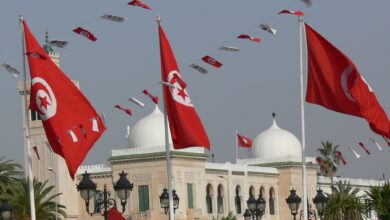Tunisian President Zein al-Abidine Ben Ali fled his country at night with no guards or official processions. As he sought refuge elsewhere, friends and allies turned him away for fear of being viewed as harboring a former dictator. Will other tyrants learn from this example?
The victory of the Tunisian people was greeted with joy across the Arab world and offers a glimmer of hope to people in the region. This achievement warrants a tribute to Mohammed Bouazizi, the 26 year old fruit seller who set himself on fire two weeks ago when his vending cart was confiscated by authorities who claimed he did not have a permit The events in Tunisia have demonstrated that change can come about through the will of the people, rather than through speeches, petitions, empty talk about the integrity of the electoral process and forming parallel parliaments.
Bouazizi deserves our prayers. His self-immolation unleashed a wave of popular anger to save Tunisians from a dictator who ruled for 23 years. In his final bid to hold on to power, Ben Ali begged Tunisians to let him complete his presidential term in return for vowing not to re-run. Angry Tunisians refused his plea and brought him down.
Ben Ali paid the price of abusing power. His long tenure ruined him and his family, a natural outcome for leaders who believe they will rule forever. Ben Ali deprived Tunisians of their freedom and in return they took away his chance at an honorable exit from power.
Glory to the people. Elites and opposition leaders can hold conferences or boycott elections, but popular anger againsts price hikes, unemployment, corruption and state repression are what have continued to shake leaders, from Egypt's bread riots in 1977 to the social protests in Algeria in 2011. A slight increase in the price of sugar led to the toppling of Jaafar Nimeiry in Sudan 27 years ago, and the confiscation of Bouaziz’s vegetable cart brought down Ben Ali in Tunisia.
People can nurse grievances for a long time and politicians are incapable of predicting when the masses will express their frustrations. People can be patient, tricking dictators into believing that they have given up. But when they revolt, their anger threatens to unseat leaders and bring down regimes.
The events in Tunisia have caused people across the region to feel the winds of change. Tunisia was not plagued with sectarian problems or threatened with partition; it just suffered from immense levels of state repression and corruption, much like other Arab countries. Who will be the first to learn the lessons from Tunisia, the rulers or the ruled?
As the Tunisian poet Abul Qasem Al-Shabi once wrote, “When people decide to live, destiny shall obey”
Translated from the Arabic Edition.




